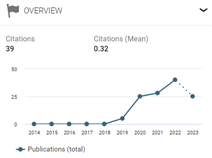Literature Review: pola makan dan kualitas diet pada remaja dan dewasa dengan HIV/AIDS
DOI: 10.30867/gikes.v5i1.1317Abstract
Background: Human Immunodeficiency Virus (HIV) infection remains an unresolved health problem in Brazil. Diet plays an important role in the immune system of HIV/AIDS patients because adequate amounts of macronutrients and micronutrients are important. Food quality has also been used as a proxy for predicting the risk of death and chronic diseases. Measuring diet quality is an indicator that can describe a person's dietary practices in accordance with the dietary recommendations set out to be able to live healthily.
Objective: This study aimed to analyze the dietary patterns and diet quality of adolescents and adults with HIV/AIDS.
Methods: This study was a systematic literature review. The protocol used in the systematic literature review of this study used the PRISMA method. The SLR protocol and evaluation were performed using the PRISMA method to select research articles that had been found. The PRISMA method collects articles from PubMed, Google Scholar, Research Gate, SINTA, Garuda, and Scopus databases. The search terms used were Indonesian and English. The search terms used in Indonesian were "Diet and HIV/AIDS" OR "Diet Quality and HIV/AIDS". The search terms in English were "dietary habit and HIV/AIDS" OR "diet quality and HIV/AIDS". The articles collected were published between 2014 and 2022.
Results: According to the findings of a systematic literature review, consumption patterns that do not meet the needs of HIV infection will lead to chronic malnutrition and AIDS, resulting in a drastic decrease in resistance to other infections. Diet plays an important role in the immune system of HIV/AIDS patients, because adequate intake of macro-and micronutrients is essential for normal functioning. Diet quality is influenced by the diversity of food ingredients and food security, which remains low. Diet quality in HIV/AIDS patients affects their body weight, mental health status, physical health status, CD4 count, and other health problems.
Conclusion: Dietary habits do not meet intake requirements due to HIV infection, which causes chronic malnutrition and, at the AIDS stage, results in a drastic decrease in resistance to other infections. Diet quality in HIV/AIDS patients affects their body weight, mental health status, physical health status, CD4 count, and other health problems.
Keywords
Full Text:
PDFReferences
Duda, P., Knysz, B., Gąsiorowski, J., Szetela, B., Piotrowska, E., & Bronkowska, M. (2021). Assessment of dietary habits and lifestyle among people with HIV. Advances in Clinical and Experimental Medicine, 29(12), 1459–1467. https://doi.org/10.17219/ACEM/128234
Horban, Andrzej., Podlasin, Regina., Cholewińska, G., Wiercińska-Drapało, Alicja., Knysz, Brygida., Inglot, Małgorzata., Szymczak, Aleksandra., Bociąga-Jasik, Monika., Jabłonowska, E., & Polskie
Towarzystwo Naukowe AIDS. (2016). Zasady opieki nad osobami zakażonymi HIV : zalecenia PTN AIDS 2016. Polskie Towarzystwo Naukowe AIDS.
Jarosz, M. (2016). Piramida zdrowego żywienia i aktywności fizyznej dla osób dorosłych. Instytut Żywności i Żywienia, 9.
Kadiyala, S., & Rawat, R. (2014). Food access and diet quality independently predict nutritional status among people living with HIV in Uganda. Public Health Nutrition, 16(1), 164–170. https://doi.org/10.1017/S136898001200050X
Miller, V., Webb, P., Micha, R., & Mozaffarian, D. (2020). Defining diet quality: a synthesis of dietary quality metrics and their validity for the double burden of malnutrition. The Lancet Planetary Health, 4(8), e352–e370. https://doi.org/10.1016/S2542-5196(20)30162-5
Mukramin Yusuf, A., Alfia, E., Muh Asrul Irawan, A., Agung Al Azhar Jl Sisingamangaraja, M., Baru, K., & Selatan, J. (2020). ‘Vegetables Everyday’: Indeks Kualitas Diet Ibu dengan HIV/AIDS di Ikatan Perempuan Positif Indonesia (IPPI) (Vol. 5, Issue 4).
Oyetunji, I. O., Duncan, A., Booley, S., & Harbron, J. (2021a). Diet quality, food insecurity and risk of cardiovascular diseases among adults living with HIV/AIDS: A scoping review protocol. BMJ Open, 11(10), 1–7. https://doi.org/10.1136/bmjopen-2020-047314
Oyetunji, I. O., Duncan, A., Booley, S., & Harbron, J. (2021b). Diet quality, food insecurity and risk of cardiovascular diseases among adults living with HIV/AIDS: A scoping review protocol. BMJ Open, 11(10). https://doi.org/10.1136/bmjopen-2020-047314
Palermo, T., Rawat, R., Weiser, S. D., & Kadiyala, S. (2013). Food Access and Diet Quality Are Associated with Quality of Life Outcomes among HIV-Infected Individuals in Uganda. PLoS ONE, 8(4). https://doi.org/10.1371/journal.pone.0062353
Runowska, M., Majewski, D., Majewska, K., & Puszczewicz, M. (2021). Vitamin D supply in patients with rheumatic diseases in Poland - a pilot study. Reumatologia, 59(3), 146–152. https://doi.org/10.5114/reum.2021.107430
Tanaka, L. F., Dias De Oliveira Latorre, M. D. R., Medeiros Da Silva, A., Roma De Oliveira Konstantyner, T. C., Mendes, E. C., & Sousa Marques, H. H. (2015a). Poor diet quality among Brazilian adolescents with HIV/AIDS. Jornal de Pediatria, 91(2), 152–159. https://doi.org/10.1016/j.jped.2014.06.007
Tanaka, L. F., Dias De Oliveira Latorre, M. D. R., Medeiros Da Silva, A., Roma De Oliveira Konstantyner, T. C., Mendes, E. C., & Sousa Marques, H. H. (2015b). Poor diet quality among Brazilian adolescents with HIV/AIDS. Jornal de Pediatria, 91(2), 152–159. https://doi.org/10.1016/j.jped.2014.06.007
Tesfaw, A., Jara, D., & Temesgen, H. (2018). Dietary Diversity and Associated Factors among HIV Positive Adult Patients Attending Public Health Facilities in Motta Town, East Gojjam Zone, Northwest Ethiopia, 2017. Advances in Public Health, 2018, 1–8. https://doi.org/10.1155/2018/6135482
UNAIDS. (2021). Global HIV Statistics. Fact Sheet 2021, June, 1–3.
Weiss, J. J., Sanchez, L., Hubbard, J., Lo, J., Grinspoon, S. K., & Fitch, K. V. (2019a). Diet Quality Is Low and Differs by Sex in People with HIV. Journal of Nutrition, 149(1), 78–87. https://doi.org/10.1093/jn/nxy241
Weiss, J. J., Sanchez, L., Hubbard, J., Lo, J., Grinspoon, S. K., & Fitch, K. V. (2019b). Diet Quality Is Low and Differs by Sex in People with HIV. Journal of Nutrition, 149(1), 78–87. https://doi.org/10.1093/jn/nxy241
World Health Organization. (n.d.). World Health Statistics 2018 : monitoring health for the SDGs : sustainable development goals.
Yusuf, A. M., Alfia, E., & Irawan, A. M. A. (2020). “Vegetables Everyday”: Indeks Kualitas Diet Ibu dengan HIV/AIDS di Ikatan Perempuan Positif Indonesia (IPPI). JURNAL Al-AZHAR INDONESIA SERI SAINS DAN TEKNOLOGI, 5(4), 191. https://doi.org/10.36722/sst.v5i4.405
Refbacks
- There are currently no refbacks.














